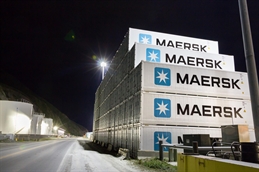
Several Danish companies involved in logistics, energy, sea and air freight have come together to develop an industrial-scale facility to produce sustainable fuels.
Copenhagen Airports, A.P. Møller-Maersk, DSV Panalpina, DFDS Seaways, Scandinavian Airlines (SAS) and Ørsted formed the partnership – the first of its kind – for producing sustainable fuels for road, maritime and air transport in the Copenhagen area as the Danish capital races to become the world’s first carbon-neutral capital city by 2025.
Jens Bjørn Andersen, CEO, DSV Panalpina, said the project “fits well with [the company’s] long-term targets to reduce emissions and find sustainable solutions for our industry. We are proud to play a part. The transport sector is very important for Denmark but leaves a significant CO2 footprint and we are committed to finding ways to pave the road for a greener future. While this initiative is local, our long-term ambitions remain global,” he said.
The parties aim to develop a hydrogen and e-fuel production facility as soon as 2023, which could produce more than 250,000 tonnes of sustainable fuel for busses, trucks, maritime vessels, and airplanes every year once fully scaled up by 2030.
A DSV statement noted that production would potentially be based on total electrolyzer capacity of 1.3 gigawatts, which would likely make it one of the world’s largest electrolyzer and sustainable fuel production facilities.
It said the production from the fully scaled facility can reduce annual carbon emissions by 850,000 tonnes.
“The partnership hopes that the project can, over time, act as a catalyst for similar projects in other parts of Denmark and internationally,” the DSV statement read.
If realized as planned, the project will be located in the greater Copenhagen area and could supply renewable hydrogen for zero-emission busses tendered by Movia and heavy-duty trucks managed by DSV Panalpina, renewable methanol for Maersk vessels and renewable jet fuel (e-kerosene) for SAS airplanes and air transport out of Copenhagen Airports.
It said the facilities will require a large-scale supply of renewable electricity, which could potentially come from offshore wind power produced at Rønne Banke off the island of Bornholm.
DSV Panalpina also earlier committed to reducing absolute Scope 1 and 2 greenhouse gas emissions – derived from offices, warehouses and company cars – by 40% by 2030 from a 2019 base year and absolute Scope 3 greenhouse gas emissions – which are emissions from its subcontracted freight transports – by 30% in the same period.
It said in 2019, the group’s total emissions amounted to 16 million tonnes CO2, of which the largest part was related to subcontracted freight transport.
The project is also expected to bring down the cost of sustainable fuels, which are currently priced higher than fossil fuels.
To become competitive with fossil fuels, the group said production of sustainable fuels needs to be “matured, built at industrial scale, and go through a cost-out” similar with what has been seen over the past decade in other renewable energy technologies, such as offshore wind, onshore wind and solar.
“Decarbonizing the road, maritime, and aviation sectors are key to bringing our economies around the world to net-zero emissions by 2050. Our vision to produce sustainable fuels in the Greater Copenhagen area will deliver the necessary industrial scaling to drive the needed cost-out towards making renewable fuels competitive with fossil fuels,” said Henrik Poulsen, CEO, Ørsted.
In the same statement, the group renewed their commitment to pursue the project despite several of the partners currently challenged by the “deep impact” of the coronavirus pandemic, noting that the proposed facility seeks not only to accelerate green transformation in Denmark but also to provide economic stimulus to the Danish economy post Covid-19.
Meanwhile, the group said renewable jet fuel (e-kerosene) may be produced in stage two of the project, which could be operational by 2027. The project has the potential to displace 5% of fossil fuels at Copenhagen Kastrup Airport by 2027 and 30% by 2030.
“Denmark is in a unique position to become a hub for the production of sustainable fuels and securing a leading position in establishing an entirely new industry, which will be key in driving decarbonization towards net zero in 2050, not just in Denmark, but also globally,” it added.
The partnership now engages with regulatory authorities on the necessary framework and policies and to seek public co-funding to conduct a full feasibility study.
A final investment decision for the first stage of the project could be made in 2021.



